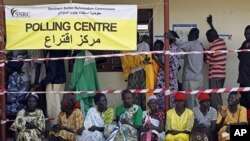Sudan’s representative to the African Union says the expected southern vote for secession from Khartoum’s rule could herald an unprecedented era of north-south cooperation. The envoy reaffirmed the Khartoum government’s pledge to honor the result of the vote, whatever it is.
Two Sudanese ambassadors, one a northerner, the other a southerner, stood side by side to report on the smooth start of what is expected to be a final step in the south’s breakaway from northern rule.
If all goes according to predictions, Sudan’s AU Ambassador Mohieldin Salim Ahmed and his deputy, Ambassador Akuie Bona Malwal will be working for different countries six months from now.
After a briefing at the AU Peace and Security Council, the northerner, Ambassador Ahmed said the expected vote for separation might ironically provide a model in healing decades-old wounds between two warring factions.
"And I am one of the optimistic people that [believes] sometime we are going to have some kind of unity also, and we want to teach our continent in this endeavor. We are going to see how can we continue with our relationship. It is one nation in two lands," he said.
Sudan President Omar al-Bashir hinted last week at a possible union during an interview with al-Jazeera television. He said north and south could join forces in a European Union-style pact in the event of a secession vote.
Ambassador Ahmed reaffirmed Mr. Bashir’s reported pledge to accept the referendum’s outcome. "Whatever the choice be the government of Sudan is going to accept it because this is a choice of the people of the south, and we are going to be as we were before as brothers north and south," he said.
Deputy Ambassador Akuie Bona Malwal, a southerner, said conciliatory moves by President Omar Hassan al-Bashir and the south’s leader, Salva Kir had calmed what he called ‘the pre-vote fever’ that might have disrupted the referendum.
"It was all positive reporting on the new attitude of cooperation between the two sides that is exemplified by the visit of president Bashir to Juba and the statement of Salva Kir as a response to Bashir, which has created part of the positive atmosphere you have witnessed in the past two days of voting all over Sudan,"
Malwal said.
AU Peace and Security official Ramtane Lamamra briefed the Council on the vote. He said while everything appears to be going smoothly, the high-level AU panel led by former South African president Thabo Mbeki is ready to step in after the results are announced to mediate talks on a number of difficult post-referendum issues.
"Mr. Mbeki’s panel is in touch with both leaders, so that immediately after the conclusion of the referendum proceedings, we will resume discussions on post-referendum arrangements, as well as on Abyei, so we believe there will be no political vacuum. The diplomacy in its own rights is working very actively, very diligently," Lamamra said.
Lamamra and Sudanese diplomats say if all goes well during and after the referendum, southern Sudan could become Africa’s newest country as early as the second week in July.
Sudan Envoy: Secession May Help Heal North-South Enmity




